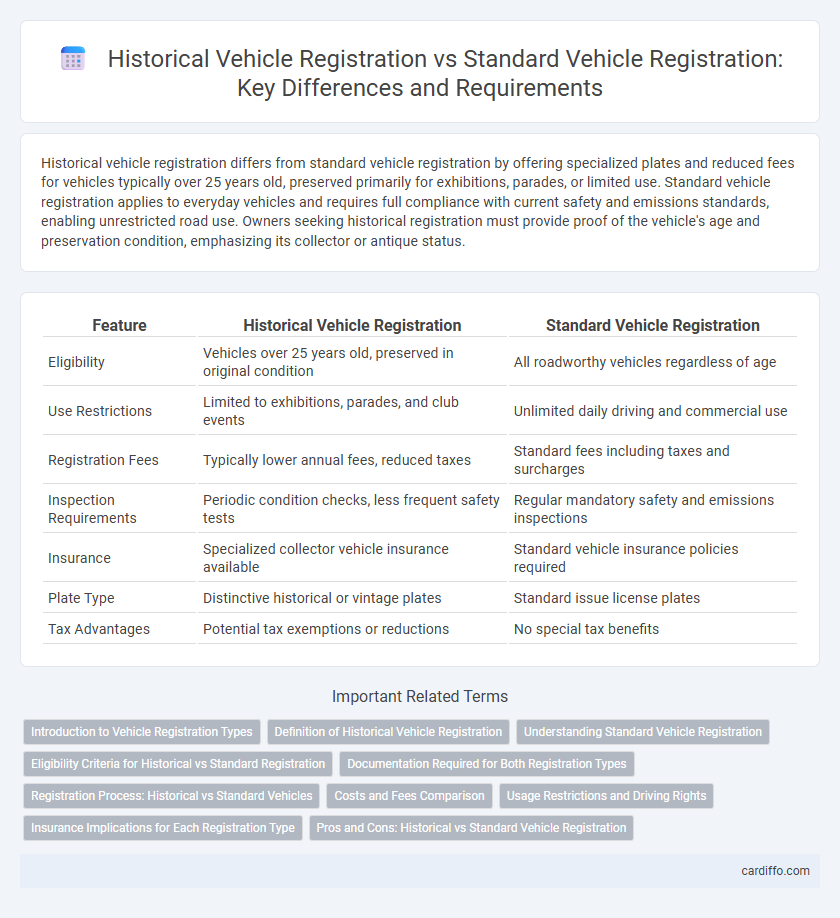Historical vehicle registration differs from standard vehicle registration by offering specialized plates and reduced fees for vehicles typically over 25 years old, preserved primarily for exhibitions, parades, or limited use. Standard vehicle registration applies to everyday vehicles and requires full compliance with current safety and emissions standards, enabling unrestricted road use. Owners seeking historical registration must provide proof of the vehicle's age and preservation condition, emphasizing its collector or antique status.
Table of Comparison
| Feature | Historical Vehicle Registration | Standard Vehicle Registration |
|---|---|---|
| Eligibility | Vehicles over 25 years old, preserved in original condition | All roadworthy vehicles regardless of age |
| Use Restrictions | Limited to exhibitions, parades, and club events | Unlimited daily driving and commercial use |
| Registration Fees | Typically lower annual fees, reduced taxes | Standard fees including taxes and surcharges |
| Inspection Requirements | Periodic condition checks, less frequent safety tests | Regular mandatory safety and emissions inspections |
| Insurance | Specialized collector vehicle insurance available | Standard vehicle insurance policies required |
| Plate Type | Distinctive historical or vintage plates | Standard issue license plates |
| Tax Advantages | Potential tax exemptions or reductions | No special tax benefits |
Introduction to Vehicle Registration Types
Vehicle registration types categorize vehicles based on their use, age, and historical significance, distinguishing between Historical Vehicle Registration and Standard Vehicle Registration. Historical Vehicle Registration applies to vintage or classic cars typically over 25 years old, offering benefits like reduced fees and usage restrictions for preservation purposes. Standard Vehicle Registration covers everyday vehicles, requiring regular renewal and adherence to standard regulations for road use and ownership documentation.
Definition of Historical Vehicle Registration
Historical Vehicle Registration applies to vehicles typically over 25 years old that are preserved for their historical significance and seldom used for regular transportation. This type of registration often comes with restrictions on mileage and usage to maintain the vehicle's condition and authenticity. Standard Vehicle Registration covers everyday vehicles without age or usage limitations, allowing for unrestricted operation on public roads.
Understanding Standard Vehicle Registration
Standard vehicle registration involves registering a vehicle for everyday use, ensuring compliance with local laws, current safety and emissions standards, and eligibility for insurance coverage. This process requires up-to-date documentation, such as proof of ownership, valid insurance, and successful vehicle inspections. Unlike historical vehicle registration, which applies to classic or antique vehicles with specific usage restrictions, standard registration supports unrestricted road use and regular renewal cycles.
Eligibility Criteria for Historical vs Standard Registration
Historical vehicle registration requires the vehicle to be at least 25 years old, preserved in or restored to a condition that represents its historical significance, and usually prohibits regular daily use. Standard vehicle registration applies to vehicles of any age that meet current safety and emission standards, allowing full daily operation on public roads. Eligibility for historical registration prioritizes age and condition for collector status, whereas standard registration focuses on compliance with modern regulatory requirements.
Documentation Required for Both Registration Types
Historical vehicle registration requires proof of the vehicle's age, such as a manufacturing date certificate, along with a completed application form and proof of ownership. Standard vehicle registration demands a valid title, proof of insurance, emissions test results if applicable, and identification documents. Both types mandate payment of registration fees, but historical registrations often necessitate additional documentation verifying the vehicle's classic or antique status.
Registration Process: Historical vs Standard Vehicles
The registration process for historical vehicles typically requires proof of the vehicle's age, often needing documentation that verifies it is at least 25 years old, along with restrictions on usage and modifications. Standard vehicle registration involves submitting current ownership documents, passing emissions and safety inspections, and paying applicable fees without age-based criteria. Historical vehicle registrations often allow for reduced fees and exemptions from certain regulations, contrasting with the comprehensive procedures mandated by standard vehicle registration.
Costs and Fees Comparison
Historical vehicle registration typically incurs lower fees compared to standard vehicle registration due to reduced annual renewal charges and eligibility for discounted or waived taxes. Standard vehicle registration fees often include full-rate registration costs, emissions testing fees, and may vary based on vehicle weight and market value. Cost differences can range significantly, with historical vehicle registration offering a more budget-friendly option for classic car owners seeking to preserve and legally operate vintage automobiles.
Usage Restrictions and Driving Rights
Historical vehicle registration is typically restricted to vehicles over a certain age, often 25 years, and limits usage to events like exhibitions, parades, and club activities, prohibiting daily driving. Standard vehicle registration grants full driving rights without usage limitations, allowing vehicles to be used for daily commuting, commercial purposes, and unrestricted travel. Owners of historically registered vehicles must comply with specific regulations restricting mileage and vehicle modifications to maintain eligibility, while standard registrations have fewer such constraints.
Insurance Implications for Each Registration Type
Historical vehicle registration often results in lower insurance premiums due to limited mileage and usage restrictions, making it ideal for classic car enthusiasts. Standard vehicle registration requires full coverage insurance, offering broader protection but typically at higher costs reflecting daily vehicle use and market value. Insurers assess risk differently for each type, emphasizing vehicle age, frequency of use, and restoration status in historical registrations versus ongoing depreciation and accident risk in standard registrations.
Pros and Cons: Historical vs Standard Vehicle Registration
Historical vehicle registration offers benefits like reduced fees, exemptions from emissions testing, and preservation of classic car status, ideal for collectors and enthusiasts. Standard vehicle registration provides broader usage rights, including daily driving without restrictions, but often involves higher costs and mandatory inspections. Choosing between historical and standard registration depends on vehicle use, cost considerations, and compliance with local motor vehicle laws.
Historical Vehicle Registration vs Standard Vehicle Registration Infographic

 cardiffo.com
cardiffo.com